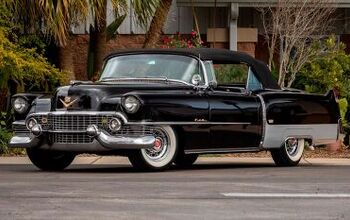Book Review: Icons and Idiots: Straight Talk on Leadership
Bob Lutz’s latest tome isn’t so much about cars as it is a business book on leadership that happens to be about cars. Through 11 vignettes, Lutz talks about the leadership figures in his life, their triumphs and foibles and how they impacted his personal and professional development.
Along the way we meet a broad cross section of figures, including Lutz’s high school teacher who eventually became Switzerland’s President, his Marine Drill Sergeant, and the CEO of Exide Batteries, who ended up becoming one of the first white collar criminals of the new millennium.
Don’t worry, there are plenty of auto world figures too, from household names like Harold “Red” Poling (Ford’s former CEO) and Chrysler’s Bob Eaton, to lesser known players like Eberhard von Kuenheim (an orphaned, near-penniless aristocrat who rose to the top of BMW. Lutz credits him with turning BMW from a “tiny, regional auto company into a global luxury-car powerhouse).
All of the characters outlined in the book are three-dimensional, with their own flaws and quirks. Even the most wretched and obnoxious among them are praised by Lutz for their business acumen, their charm or their quantifiable results. By the same token, the affable, kind and caring are panned for their failure to achieve corporate goals or take a stand when it was required.
Poling and von Kuenheim represent the most compelling narratives and the most relevant to the site. A petty, Machiavellian figure, von Kuenheim never failed to take credit for other people’s great ideas and was more than happy to throw his subordinates, Lutz included, under the bus. He was (according to Lutz) unable to tolerate anyone who was capable of outshining the master, a factor which drove Lutz to leave BMW. Nevertheless, Lutz expresses an admiration for the man, as he was able to make BMW what it is today. Without von Kuenheim, the 3, 5 and 7-Series cars, along with their famous naming conventions, would literally not exist.
At the opposite end of the spectrum is Ford CEO Harold “Red” Poling who is depicted as an infamous tightwad, a royal pain in the ass and totally myopic in all matters that cannot be quantified. All right brain thinkers will be able to relate to Lutz’s frustration at having to deal with a figure like Poling – those of us who rely on our gut instinct, honed over thousands of years of evolution, know that numbers can in fact be fudged to mis-represent things and the real world turn of events can not always be reflected in an Excel spreadsheet. But try telling that to a boss who believes that “if it can’t be quantified, it doesn’t exist”.
Poling’s obsession with cost-savings, data and procedure ended up creating massive inefficiencies at Ford, with workers resorting to manipulation (scheduling multiple meetings to get projects approved while using absurdly high budget estimates. Poling would demand multiple revisions until there was a mutually agreed upon target – which ended up being what the workers wanted in the first place), deceit and other tactics to get their way. Poling’s instincts for product were awful as well; at one point, he chides Lutz for backing the 1986 Taurus, stating that Ford should have made a K-Car instead. Another hilarious exchange has him chewing out Lutz for reading Auto Motor und Sport at his desk. When Lutz replies that he has to stay on top of the competition, Poling is utterly disdainful
“Nonsense. All people want is a car that starts every morning and gets them to work on time. You don’t need to read car magazines to figure that one out.”
Despite all that, Lutz learns a valuable lesson; you do need to be mercenary about sticking to your budgets and targets, or else projects can balloon in both cost and complexity. The engineers and planners will inevitably find a way to make do with what they are given.
As always, Lutz’s writing is crisp, funny and concise. At the end, there are scorecards for each leader, perhaps a wry concession to those who, like Poling, need quantitative data for just about everything. There is also a treatise about leadership at the end that touches on what Lutz believes is the essence of a good leader; one who is honest, direct, holds his troops to a high standard and has a laser-like focus on their vision and goals.
In that context, the book helped me evaluate my managers, both past and present. It helped me view them in a much more complex manner, rather than just as “good” or “bad”. As someone who not only has to manage a staff of writers, it also informed me of how I can improve my own conduct on the job. Leadership is tough – especially when you have to lead the same people you used to write to, asking if they would publish your early (and unpolished) work. It’s one of those things that can only be honed by experience rather than erudition. But at least Icons and Idiots helped give me the context needed to be a good boss, without having to endure seven decades of bad ones.
More by Derek Kreindler
Latest Car Reviews
Read moreLatest Product Reviews
Read moreRecent Comments
- ChristianWimmer The body kit modifications ruined it for me.
- ToolGuy "I have my stance -- I won't prejudice the commentariat by sharing it."• Like Tim, I have my opinion and it is perfect and above reproach (as long as I keep it to myself). I would hate to share it with the world and risk having someone critique it. LOL.
- SCE to AUX Sure, give them everything they want, and more. Let them decide how long they keep their jobs and their plant, until both go away.
- SCE to AUX Range only matters if you need more of it - just like towing capacity in trucks.I have a short-range EV and still manage to put 1000 miles/month on it, because the car is perfectly suited to my use case.There is no such thing as one-size-fits all with vehicles.
- Doug brockman There will be many many people living in apartments without dedicated charging facilities in future who will need personal vehicles to get to work and school and for whom mass transit will be an annoying inconvenience


































Comments
Join the conversation
'by the same token, the affable, kind and caring...' ok, didn't plan on commenting today as i'm too busy, but that phrase has been bothering me all day. Don't believe it for a minute, Derek. The two things mentioned are not necessarily mutually excluding. This is just what ruthless men tell themselves when they lay their heads on their pillows at night so they can sleep. It's just self serving justification for their sometimes cruel and not necessary decisions even business wise. Just a lame mantra to keep personal accountability at arm's length.
So now we have seen Lutz hand out score cards to everyone, can we see his score card?